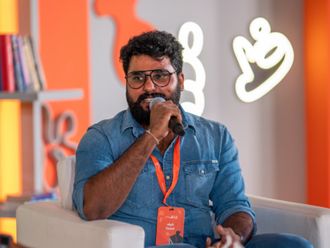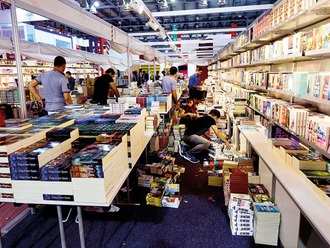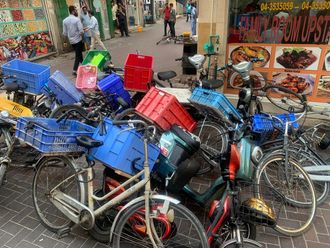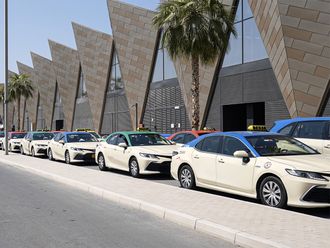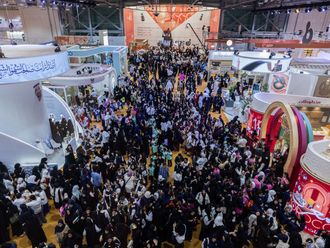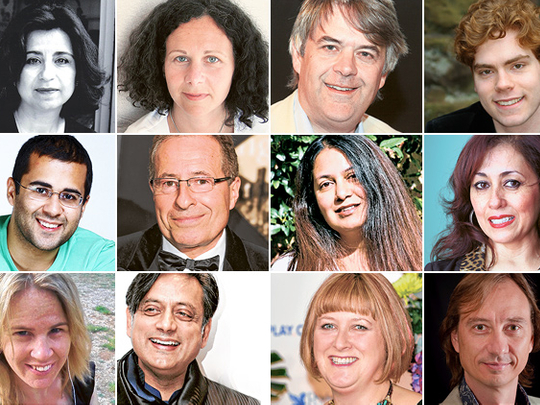
Middle row (from left): Chetan Bhagat, Peter James, Sunetra Gupta and Suzanne Husseini
Bottom row (from left): Lisa Dempster, Shashi Tharoor, Sally Gardner and Dr Stuart Clark. Image Credit: Supplied
Facebook. Twitter. Blogs. Words that have become a part of everyday conversations and yet seem to be missing in the lives of wordsmiths.
With the Sharjah International Book Fair 2011 starting on Wednesday, Gulf News decided to find out whether social media has had any impact on the literary and publishing world. While platforms such as Twitter and Facebook are built primarily to encourage communication, we realised that for some authors the link between social media and easy communication might not be as natural as one might presume.
Gauging popularity
In an experiment aimed at understanding whether authors have embraced this wave of change in the way we communicate, Gulf News decided to approach 26 authors who will be attending the book fair. The question was simple: What impact has social media had on the literary world? However, to approach the writers, we used both traditional media (primarily e-mail) and social media — Facebook, Twitter and personal websites and blogs.
The aim was to find out if these new platforms were a popular tool among professional writers. Do platforms such as Facebook, Twitter and personal blogs help them reach out with their writing to the masses? Also, do they use social media to connect and interact with their readership, which has traditionally been a relatively passive consumer of their writing?
No accounts
While notable names in the literary world seem to be actively using social media to connect with people, the overwhelming majority seemed to prefer the more traditional form of communication — e-mail.
The difference between authors from the English and Arabic world of literature was also stark. While many English writers seemed to have embraced social media to a certain extent, many Arabic authors did not have accounts on social media websites or even a personal blog. And cutting across continents — even for those authors who have an active social media profile — the most common refrain to our request for interviews was "e-mail is the best".
But many authors were also passionate defenders of the virtues of social media.
Describing how he harnessed social media to promote his new book, British crime fiction writer Peter James said: "This year, mindful that my new hardback, Dead Man's Grip, was coming out head to head with the new James Bond book, Carte Blanche, by Jeffery Deaver, I put extra special effort in seeding the book to my fans months in advance, giving links to Amazon and Tesco sites for advance purchasing, and in the weeks before the May 26 launch, I tweeted the opening chapter, 140 characters at a time! We beat Carte Blanche to No 1, one week by just 94 books, and kept it off No 1 the following week too. It was a narrow, but utterly crucial margin."
Anglo-Egyptian novelist and political and cultural commentator Ahdaf Soueif, whose second novel The Map of Love was shortlisted for the Man Booker Prize, is more circumspect. "I'm not sure if social media has actually had a big effect on the literary world," she says. "But, insofar as it has, it has injected a new discourse, new players, and a new burst of energy into it."
And some, like Dubai-based celebrity chef and cookbook writer Suzanne Husseini, have managed to find the perfect balance. "This is the dawn of a new era, and as I tweet about my latest endeavours and share on Facebook a new recipe, I still relish the pleasure of a book in my hand and when I've read it, it finds its place on the shelf and stays connected to me like an old friend. That is irreplaceable," she says.
‘Huge split'
Perhaps the social media divide is best summed up in the words of Scottish author of historical fiction, Sara Sheridan: "I was in a book festival green room surrounded by luminaries when I first realised there was a huge split in the writing community. I asked if anyone else was on Twitter — in fact, you'd have thought I'd asked if anyone else had recently stabbed their kids in the heart. It just poured out. Writers who'd seemed retiring and quite reasonable started to hiss about intrusion of privacy and the importance of paper books and how un-green it was to sport a Kindle."
Here we present the results of the social media experiment as well as the views of some of the notable authors who will be attending the Sharjah Book Fair.
Social media is now part of our daily lives — from work to research to entertainment to culture, there's no denying its powerful presence around us. But when it comes to the literary world, how much of this is reality? Do authors feel that a social media profile will erode the dignity of their writing and distract their attention or do they find in it an effective accomplice to promote their work and reach out to a wider community of fans? With the Sharjah International Book Fair beginning tomorrow, Hub Editor Chiranjib Sengupta and Community Web Editor Huda Tabrez put some of the participating authors to test
Gulf News selected a list of 26 authors participating at the Sharjah Book Fair. Every author who agreed to an interview were then sent the following questions:
Q1. What are your expectations from the Sharjah Book Fair this year? Is this your first appearance at the festival?
Q2. What do you think has been the impact of social media on the literary/publishing world?
Dr Stuart Clark
Astronomer and journalist, UK
Medium of response: Email
Q1 I'm looking forward to the Sharjah International Book Fair very much as it sounds unique among the literary festivals I have attended. Having the authors in Sharjah for a week or even a fortnight instead of just for their event is a great thing. I'm looking forward to hanging out with the other authors. And, of course, I can't wait to meet the audience and tell them my stories. It sounds like a literary university party and I'm looking forward to enjoying it for a week.
Q2 I think social media is having a very positive impact on the literary or publishing world. As a writer it helps me connect with my readers. On Twitter, I can now swap messages with people all over the world. Books sell by word-of-mouth and social media makes it easier than ever before for readers to tell others about the books they love.
Suzanne Husseini
Dubai-based chef and cookery writer; Canadian-Palestinian
Medium of response: Email
1. I have attended the Sharjah Book Fair before but this is my first time participating at this very important event. I like a book fair to be a place where every person can find something to pique his or her interest. At the best book fairs there are workshops covering a range of topics, hands on activities for children and adults, plenty of places for people to lounge and read, games and small competitions that would get children excited about the world of books written and digital. All in all it should be a place where you can get lost in the moment and hopefully fall in love with books and reading for pleasure. And speaking of love, the show kitchen is a great and valuable addition for people to discover and learn about other cultures through food. Cook books generate a lot of business for publishers all over the world. It seems the true language of love is food.
2. The world as we knew it has been altered forever. The internet and the speed at which we can access information are remarkable. We now live in an age where we can communicate through our phones instantly. A whole generation is growing up using a different thought process when writing by way of clicking and sliding buttons. Books can be read on iPads and applications give us moving visuals to entertain and get the message across. Facebook and Twitter connect us and gives us the play-by-play of our events and thoughts.
Publishers certainly have had to adapt to this new age of social media and digital publishing. This is the dawn of a new era, and as I tweet about my latest endeavours and share on Facebook a new recipe , I still relish the pleasure of a book in my hand and when I’ve read it, it finds its place on the shelf and stays connected to me like a old friend. That is irreplaceable.
George Goodwin
Author and historian; UK
Medium of response: Email
1. This is my first appearance at the Festival and, as an historian, I could light-heartedly say that I normally prefer to comment on things after they have happened! Seriously, I am very much looking forward to this high-profile event. Sharjah has steadily, over three decades, established itself as a major centre for the exposition of the written word and for the transfer of intellectual capital. It will be great to see this in action at the Book Fair.
2. Social media has enabled people to link together through interest rather than locality. It has broken the barriers of distance to join like-minded people: fostering that community of interest. It does not mean that personal connection has been removed, indeed social media can help to maintain interest in the time between personal meetings. A Facebook page or a simple twitter can do that by linking an author to his community. It means that authors have to work at keeping in touch - which then begs the question, in a busy schedule, of whether the author should be telling people about his last book or writing the next one? In my case, should I be telling people about my published book Fatal Colours - Towton 1461 (about the tragic reign of Henry VI, King of England and France) or the next one Fatal Rivalry – Flodden 1513 (about the reigns of two tremendously charismatic kings, Henry VIII of England and James IV of Scotland and the fatal showdown between them). The answer is both! Authors now have to communicate personally with their potential audiences more than before and social media gives them the means. Does this bring extra sales: well let’s see – I shall do some tweets about being at the Sharjah International Book Fair and see if it works…..
Lisa Dempster
Creator of the Melbourne Emerging Writers Festival; Australia
Medium of response: Email
1. This is my second visit to the Sharjah Book Fair. I first attended in 2010 and was impressed by the vitality of the discussions and presentations. I am expecting there to be more robust debate and exchange of ideas in the Book Fair's extended program this year, and am especially excited by the country focus of India and city focus of Edinburgh. I am also particularly looking forward to meeting fellow writers and festival guests, as I know from my experience last year that the Sharjah Book Fair programs talented writers from a diversity of backgrounds and specialities.
2. Social media has made a huge impact on the literary world. Reading is again becoming a social activity, as people can connect with fellow readers from around the globe to discuss and debate literary topics. In addition, readers can establish relationships with their favourite authors, as can authors and publishers; that social media is forging increased international literary relationships is especially exciting. Where once literature was something of a 'closed shop', with social media anyone is welcome to join the conversation and get to know the people working in the industry. The opportunities that social media currently present are changing the face of publishing and the literary industry as we know it. Writers with a great idea or a unique voice are using social media tools like blogs, Twitter and Facebook to develop an audience and test out their ideas. Where once publishers were the masters of marketing, writers are increasingly doing their own self-branding, and there has been a rise in self-publishing and other author-generated activities. Social media is invigorating the literary world, which with a rise in digital publishing, is becoming increasingly innovative, so readers have more ways than ever to engage with books and writing.
Sally Gardner
Children’s writer and illustrator; UK
Medium of response: Email
1. I’m very much looking forward to attending the Sharjah Book Fair. I've never been to the United Arab Emirates and it's a place I've always wanted to visit. For me this will be a very exciting trip indeed; I look forward to meeting authors and publishers from all over world, people you might not meet at an English or European book fair. I feel very honoured to be asked. It will be the first time that I’ve spoken about my new book 'The Double Shadow' outside the UK - that in itself is a wonderful opportunity. A fair like this is vital, as it brings many aspects of the literary world together in discussions about story and its role in modern society. Reading is a porthole to the world and out into universe, it’s a way of understanding the condition we call human.
2. I sometimes wish writing the book was enough, but today writers have to go out there in a much bigger way than we used to. I'm now on Twitter, Facebook, blogging - and it's a lot of work. But I do think it's helping my books reach wider audiences. Social media can get people interested in reading and wanting to read - and so the richer our culture will become. The knowledge that is gained through the pages of a book brings with it a goldmine of understanding that I think can help make for a more peaceful world. I’m really interested in the potential of e-books, although many in the publishing industry see them as a threat. In England in 1936, Penguin bought out the now classic paperback – this was the first time the general public had access to cheap, brilliant books. Everyone was able to read writers whose novels had shaped the 19th and 20th centuries. It democratised literature for all.
At the time Penguin started this paperback revolution, other publishers believed it would be an unprofitable disaster. They couldn’t have been more wrong or more short sighted. I can see comparisons here with e-publishing – at the moment, many still think it’s not the future. But I believe that it isn’t the medium the book is printed in that matters – it’s the fact that it makes reading more accessible – surely that’s what is important? I realise the e-market is still in it’s infancy in terms of the price of the Kindle and other devices, but I think in the future they will become cheaper and available to all. We’re in an interesting time in history that I call living between paper and parchment. What I hope as a writer is that our intellectual property is protected and that publishers have learned some salutary lessons from the music industry...
Sara Sheridan
Scottish author of historical fiction; UK
Medium of response: Email
1. I am trying not to have any expectations of the festival. I haven't been to a Middle Eastern Book Festival before though I appear regularly at festivals all over the UK. I'm really excited about coming along and keen to understand more about readers from the Arabian Peninsula and of course, experience a different culture, which always challenges the creativity. It'll be fun to meet the other authors too - I'm looking forward to that.
2. Social Media has revolutionized life for many writers. Previously it was difficult for readers to get in touch, but social media means that many of the barriers that existed are no longer in place. I love twitter! Readers tell me what they think of my stories (both good and bad) and it allows me to communicate easily with other writers (and compare notes about publishers, contracts, events and readers). The instant nature of it is really exciting - I've met some wonderful people and had a lot of help. Recently I tweeted a couple of questions about an issue I was researching and people were enormously generous in coming back with answers. It definitely puts writers in the driver's seat far more than was possible before. My view is that social media has had less of an impact on publishing though other digital technologies have certainly shaken things up in the publishing world.
Dr Stuart Clark
Astronomer and journalist, UK
Medium of response: Email
1 I'm looking forward to the Sharjah International Book Fair very much as it sounds unique among the literary festivals I have attended. Having the authors in Sharjah for a week or even a fortnight instead of just for their event is a great thing. I'm looking forward to hanging out with the other authors. And, of course, I can't wait to meet the audience and tell them my stories. It sounds like a literary university party and I'm looking forward to enjoying it for a week.
2 I think social media is having a very positive impact on the literary or publishing world. As a writer it helps me connect with my readers. On Twitter, I can now swap messages with people all over the world. Books sell by word-of-mouth and social media makes it easier than ever before for readers to tell others about the books they love.
Shashi Tharoor
Author, columnist, rights advocate, member of Parliament, former Indian minister and former under-secretary general at the UN; India
Medium of response: Email
1. I hope the Sharjah Book fair will help introduce contemporary Indian writing to the broad and cosmopolitan reading public of your Emirate.
2. Aside from a very few novels that have incorporated social media into their narratives, I wouldn't say that social media has had a literary impact at all.
100 Thousand Poets for Change
A global poetry movement and creators of the longest established poetry e-zine
Medium of response: Twitter
1. Yes, this is our first time at the Sharjah Book Fair. Our first time in this part of the world! Expectations abound!
Sunetra Gupta
Novelist and winner of Indian National Academy of Literature award, scientist at Oxford University; UK-India
Medium of response: Email
1. This is my first appearance at the Sharjah Book Fair and I am very excited to be participating. It will be a wonderful opportunity for me to discuss the how science and literature can feed off each other, to reach new audiences and to connect with other writers from different parts of the world. I love the how children¹s literature and cookery (one of my passions) are so well-integrated into the schedule!
2. As the mother of two teenagers, my immediate response is that it has definitely eroded their reading habits. However, there can be no doubt that - when it is harnessed correctly - social media can help disseminate information, encourage discussion and promote the sharing of good literature and ideas across international boundaries.
Ahad Soueif
Anglo-Egyptian novelist and political and cultural commentator
Medium of response: Email
1. This is my first time at the Sharjah International Book Fair. It’s my first time in Sharjah, actually, and I’m looking forward to it very much. I’ve heard very good things about it for a long time.
2. I’m not sure if social media has actually had a big effect on the literary world. But, in so far as it has, it has injected a new discourse, new players, and a new burst of energy into it.
Chetan Bhagat
Best-selling author, columnist and speaker, India
Medium of response: Email
1 It is my first visitto Sharjah, in fact to the Middle East. I am looking forward to finding my readers in a part of the world I have never been to before.
2 Social media has helped publicise books, brought authors closer to their
readers and reaching a niche audience has become simpler. Word of mouth
spreads much faster on social media — and if it is good, can dramatically help the book.
David Whitley
Children’s book writer, UK
Medium of response: Email
Q1 This is my first appearance at the book fair, and I’m looking
forward to it immensely! Both to visiting the Gulf, my first time ever in
this part of the world, and to all the talks and events. And of course, I’m relishing the chance to bring my own novels to a whole new group of young readers!
Q2 I’m very much in favour of social media. Fans of every style and genre of literature can gather online and share their enjoyment and passion in ways that just a few years ago would have been unimaginable. And from an
author’s point of view, social media also allows us to connect
with our readers.
We generally work on long, slow projects — for me, writing a novel can take a year, followed by maybe 18 months of editing and preparation before it sees publication. But I joined twitter about a month ago, and I’m loving all the responses that I get to my tweets. I’m reminded every day who I’m writing for – which for a fantasy writer is pretty important, as it keeps me down to earth, more or less.
Lisa Dempster
Creator of the Melbourne Emerging Writers Festival, Australia
Medium of response: Email
Q1 This is my second visit to the Sharjah Book Fair. I first attended in 2010 and was impressed by the vitality of the discussions and presentations. I am expecting there to be more robust debate and
exchange of ideas this year, and am especially excited by the country
focus of India and city focus of Edinburgh. I am also looking forward
to meeting fellow writers and festival guests.
Q2 Social media has made a huge impact on the literary world. Reading is again becoming a social activity, as people can connect with fellow readers from around the globe to discuss and debate literary topics. In addition, readers can establish relationships with their favourite authors, as can authors and publishers; that social media is forging increased international literary relationships is especially exciting. Where once literature was something of a “closed shop,” with social media anyone is welcome to join the conversation and get to know the people
working in the industry.
Peter James
Writer of crime fiction and film producer, UK
Medium of response: Email
Q1 This is my first appearance. I attended the first Dubai literary
festival, three years ago, and loved it. Such enthusiasm, warm people and a real passion for reading. I don’t know what to expect at Sharjah, but I know I am going to love it!
Q2 To tweet or not to tweet? That is the (140-character limit) question…
And what about Facebook? MySpace? Bebo? Google+? Blogging? Or — erm — just getting on with writing a novel. In February 2009, I bumped into my friend Anthony Horowitz, literally, on a wet chute in the Wild Wadi water park in Dubai — where we were both guests of the first Dubai Literary Festival.
Full of glee, he told me he had started tweeting, and within three weeks had amassed a (seemingly amazing then) 41 followers! I was already an avid blogger, and at that time a disenchanted MySpace user, and was at first reluctant to take on something else that would mean yet more demands on my time, especially as I was also toying with Facebook. But Geoff Duffield, Group Sales and Marketing Director of my publishers, Pan Macmillan, got very excited when I discussed it with him and urged me to have a go at both. Now, two and a half years later, I have 4,500 twitter followers and 15,000 acolytes on Facebook, and I genuinely think the effort I put into both is worthwhile in several different and very important ways.
First of all I can have direct, real-time communications with my fans — something that would have been impossible a few years ago. Research help is one of the greatest off all the virtues of the social networking sites. Frequently on twitter and Facebook I will ask my mortuary technician fans for the latest model of bandsaw used for removing skull-caps in post-mortems, a cruise line fan for the fuel consumption of a particular ship, my criminal fans how to steal a 2011 model Audi A4 (difficult) and my farmer fans how to stop our aggressive hen, Myra Hendley, from killing newly hatched ducklings in the run (eat the hen). Another, of incalculable value, is the self-promotion potential.
Do I think my social networking helped? Undoubtedly it played a role. An
important aspect of this is that my fans feel like they are talking
to me and bonding with me. I’ve also learned so much about what my readers like and dislike. It has been said that, “New technology is like a steamroller. You are either sitting on the steamroller or you are part of the road.”
Compiled by Huda Tabrez/Community Web Editor, Anupa Kurian/Readers Editor and Chiranjib Sengupta/Hub Editor





